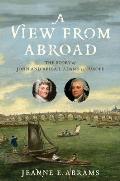“The Memorialist should apply to that source for relief”
When Henry Howell Williams asked for more than £3,600 in compensation for losses from Noddle’s Island twelve years earlier, the Congress referred his request to its Board of Treasury. (This must have happened after 10 Apr 1787, when Williams wrote to Secretary of War Henry Knox asking for his help with this petition.)
That treasury board consisted of three men, all recent Congress delegates:
- Samuel Osgood, a merchant from Andover and Continental Army veteran who had moved to New York. He would later be the first Postmaster General under the new Constitution.
- Walter Livingston of New York, like Osgood a former army commissary.
- Arthur Lee of Virginia, who had studied both medicine and law in Britain, helped John Dickinson to write “The Liberty Song,” and spent the 1770s in Europe as an American lobbyist and diplomat annoying other American lobbyists and diplomats.
On 1 Aug 1788 that board told the Congress:
the damage done to the property of the Memorialist, and the articles stated to have been applied to the benefit of the United States, was previous to the formation of an Army, under the authority of the Union.In short, the Congress sent Williams back to Massachusetts since the Battle of Chelsea Creek happened before any Continental Army legally existed.
The Board are therefore of opinion, that if the evidence adduced in proof of the value and quantity of the articles stated to have been applied to the public use was more satisfactory than in fact it is, it would be improper to establish a Precedent, in the present instance, for an admission of numerous Claims, on the merits of which it would be impossible for the Officers of the Treasury to form any competent judgement.
The general fact, of a very valuable property belonging to the Memoralist, having been either destroyed or used for the benefit of the Army assembled at Boston in the month of May 1775, by order of a Board of General Officers, appears by the Certificate of the late Commissioner of Accounts for the State of Massachusets, marked A, to have been well established:
Inasmuch however as the aforesaid property appears to have been applied for the immediate benefit of the State, and as the merits of the Claim can be best ascertained under their authority, The Board are of opinion, that the Memorialist should apply to that source for relief; and should Claims of a similar description be hereafter allowed by the general Board of Commissioners, the State will obtain reimbursement for such sums as shall appear an equitable compensation for the real damage sustained by the Memorialist.
It’s probably also significant that the Confederation Congress was on its last legs. It didn’t have enough money to pay all its bills. So few delegates were coming to New York that the body often lacked a quorum—hence the use of commissioners for day-to-day administration, and the long delay in actions. By the time this board submitted its report, a new Constitution was being publicly debated.
TOMORROW: Back to Massachusetts.









_p2.509_SIR_PHILIP_FRANCIS_K.C.B..jpg/169px-READ(1879)_p2.509_SIR_PHILIP_FRANCIS_K.C.B..jpg)


